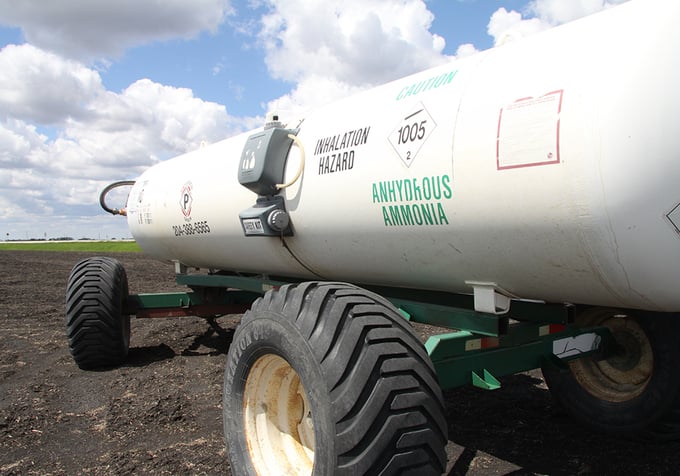November 27, 2025 | 20:35 GMT +7
November 27, 2025 | 20:35 GMT +7
Hotline: 0913.378.918
November 27, 2025 | 20:35 GMT +7
Hotline: 0913.378.918

Farmers around the world will be lowering their application rates of nitrogen fertilizer due to stratospheric prices of the vital crop input. "The world's food supply cannot be maintained without nitrogen," said Svein Tore Holsether, president of Yara International. Photo: WP
The head of the world’s leading fertilizer company is worried that food production will falter as nitrogen fertilizer supplies tighten.
“We are deeply concerned about the state of global agriculture,” Svein Tore Holsether, president of Yara International, said during the company’s third quarter 2022 conference call.
Fertilizer supplies are being squeezed as manufacturers curtail production due to sky-high natural gas prices. That is happening amid what Holsether described as an “escalating food crisis.”
The U.S. Department of Agriculture’s Economic Research Service estimates there are 1.3 billion food-insecure people in 77 low- and middle-income countries in 2022, up 10 percent from last year due to COVID-19 and the war in Ukraine.
Farmers around the world will likely be lowering their application rates of nitrogen fertilizer due to high prices of the vital crop input.
“The world’s food supply cannot be maintained without nitrogen,” said Holsether.
Global grain yields would drop an estimated 43 percent in one year if there was no nitrogen applied to the soil, according to Yara. That is obviously not going to happen but there will be cutbacks on how much is applied due to tightening supplies.
Production is being sharply curtailed in the European Union, which supplies 15 percent of the world’s finished nitrogen fertilizer products. About half of the EU’s production capacity has been idled due to Russian restrictions on natural gas supplies to the region.
Spot gas prices in the EU were up 248 percent compared to the third quarter of 2021.
“Yara’s markets have never been more challenging than what we have seen in the past 12 months with European production costs reaching an all-time high,” said Holsether.
The cost of producing urea topped US$1,500 per tonne at times during the third quarter.
Yara operated at 57 percent of its production capacity in Europe in the third quarter, down from its more typical rate of 80 to 90 percent. The curtailments have taken 1.7 million tonnes of Yara’s ammonia and 900,000 tonnes of its finished fertilizer production capacity off the market.
As a result, the company’s fertilizer deliveries were down 26 percent compared to the third quarter of 2021, including a 35 percent drop in the Americas.
“In addition, there is also less supply available from China and several other locations as well,” said Holsether.
Fertilizer inventories are at historically low levels in Europe and there is a risk of nitrogen fertilizer shortages and price spikes this winter, especially if natural gas availability further deteriorates.
“The world needs all the fertilizer at its disposal,” he said.
However, he cautioned the EU against importing fertilizer from Russia to make up for the lost European production.
“In the long-term, it is critical for Europe to reduce our dependency on Russia, not only within energy, but also within fertilizer and food,” said Holsether.
Russia supplies 14 percent of the world’s urea, 21 percent of its potash, 23 percent of its ammonia and 46 percent of its ammonium nitrate.
Yara wants the EU to accelerate its use of renewable energy and to secure continued access to natural gas for the fertilizer sector from other suppliers, so that the industry is less reliant on Russian natural gas.
(Producer.com)

(VAN) A new study reveals how the simultaneous effects of ocean acidification, salinity and loss of oxygen are making the world more fragile.

(VAN) Hopes are growing that the creation of the first 3D turkey gut model could be a turning point in the battle against the virulent blackhead disease.

(VAN) Tyson, America’s biggest meat supplier, plans to shutter one of its largest beef processing plants as the industry continues to struggle with low cattle supplies and political pressure from Washington.

(VAN) New FAO study shows how digital solutions are empowering farmers and fishers to prevent losses and build resilient agrifood systems.

(VAN) Brazil's COP30 presidency pushed through a compromise climate deal on Saturday that would boost finance for poor nations coping with global warming but that omitted any mention of the fossil fuels driving it.

(VAN) Poultry farmers in the UK have been warned that they could face one of the worst winters yet for bird flu.

(VAN) Prices of main-crop paddy have risen sharply, with jasmine rice hitting 16,100 baht per tonne — the highest level in years.